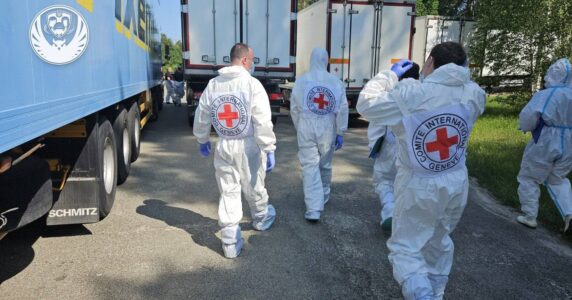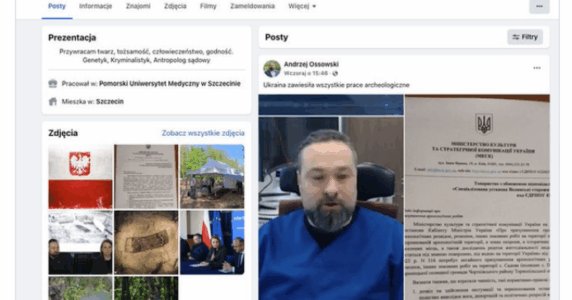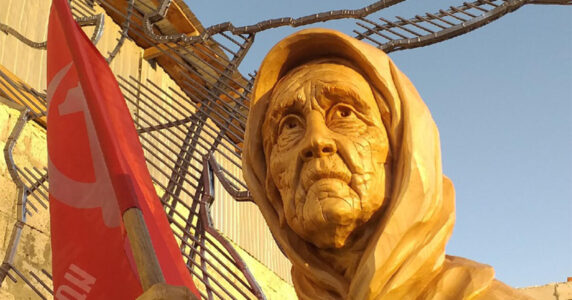Navigation and useful materials
Russia began its information war against Ukraine long before the full-scale invasion on February 24, 2022. Actually, Russian propaganda against the state of Ukraine started long before the occupation of Crimea eight years ago.
It was on the information frontline that Putin began the war. The goal there was to make all the necessary preparations before Russian troops would openly attack Ukraine and start killing civilians. The Russian people had to be prepared for the war, with the “right” public opinion formed in their heads for them. They were to have no doubt that Ukraine is an artificially founded state, and the Ukrainians are renegades who refused the history shared with Russia, “became Nazis” and anti-Russian weapons controlled by Western villains.
Let’s see why Russian propagandists harm Ukraine no less than Russian army generals and troops and look into the “faces” waging the information war against Ukraine.
Soviet legacy
In over 20 years in power, Putin managed to practically resuscitate all the Soviet propaganda instruments. And even “multiply” them, as he likes to say.
Following in the Soviet Union’s footsteps, Russia maintains total control over information. The movie industry is churning out more and more flicks with the necessary ideas, showing the heroic Russian army, the rotten West, and the “despicable Ukrainians.”
Schools and other educational institutions carry out parades and “patriotic” (zombifying, really) classes. And television, which is still a craved economic good and the only source of information in Russia’s farthest corners, keeps making endless assertions of Russia’s “greatness.” These assertions have basically turned into a magic spell.
Such dictatorship over the media has become Putin’s go-to method of “raising” a society that is convenient for the government. This has made it possible to make this cruel war, during which Ukrainian cities are shelled and civilians are killed, legitimate in the eyes of the people. According to the polls (which should naturally be taken with a grain of salt because they are Russian polls), over 70% of Russians support their country’s aggression in Ukraine.
“Dehumanization” and hatred toward Ukraine as a “fuel” for aggression
For no less than eight years, Russian propaganda has been doing everything in its power to make the Russians hate Ukraine as a state and the Ukrainians ready to fight for it. According to Russian handbooks, these Ukrainians are not patriots, they are “Banderites” and “21st-century Nazis.”
It is this perceived “Nazism” that Russia chose as a base for its anti-Ukrainian rhetoric. This makes it easier to create an image of Ukraine as an absolute evil and mobilize the population to fight against the “enemy.”
This propaganda found its symbol, as it were, in a story about “a boy crucified by Ukrainian Nazis” in Slovyansk. Naturally, this unsubstantiated story felt like a joke to anyone capable of critical thinking. Some Russians, however, might well have believed this propagandist fib and the likes of it. After all, such stories spread in spades on Russian news and social media. This includes tales of “concentration camps in Donbas,” biolabs, the “oppressed Russian speakers” and other equally absurd things.
One of the objectives of this war, announced by Russia in February 2022, is so-called “denazification” (here we go again with Russia’s attempts to equal Ukraine to a Nazi regime). However, the “denazification” of Ukraine was mentioned in Russian media long before that time, in 2015–2016 at the very least. With time, Russia revealed more threatening details, getting more and more unapologetic in its claims.
In early 2021, when Russian forces first approached our borders, Russian propaganda started calling Ukraine “Anti-Russia” and openly comparing our country to Hitler’s Germany. This helped convince Russians that Ukraine was a new center of Nazism in the 21st century. And this became the much-needed informational background for both the military and the entire Russian population before February 24, 2022.
Revanchism as Russia’s national idea
For the past 30 years, the Kremlin, like all the Russian people, has sought its greatness not in reforms or economic achievement but in the “achievements” and “victories” of the past.
The collapse of the Soviet Union became a personal tragedy not only for Putin but also for plenty of Russian citizens. After all, the “evil collective West”, which was opposed by the good Soviet superpower, allegedly won, achieving its goal by destroying the USSR. That’s why, Putin believed, the power of the empire must be restored and increased, and revenge must be taken on the West.
Hence the second “pillar” on which Russian propaganda is built, that is, revanchism. Russia has harbored hatred for the USA and Europe, along with all their “accomplices”. Ukraine joined the list when it finally decided to break with the Soviet past and join the EU.
Russia responded by occupying Crimea and parts of the Luhansk and Donetsk regions. And propaganda started spreading the idea that “Ukrainians must be killed because the West uses them as puppets to destroy Russia.”
The faces of Russian propaganda
In its propaganda, Russia involves mouthpieces from completely different areas. And this is what makes the “zombification” work. The voices of propaganda are not only media personalities or politicians — they are often writers, musicians, athletes, priests, and others.
Among the most famous propagandists, “feeding” the Russians hatred towards Ukraine for years is Russia Today editor-in-chief Margarita Simonyan. She actively supported the annexation of Crimea in 2014 and continues to support the war in Ukraine.
Another well-known propagandist who contributed to the preparation of Russia’s war against Ukraine is Olga Skabeeva. Together with her husband, Yevgeny Popov, she hosts the daily talk show “60 Minutes”, the main topic of which is not at all Russia and its internal problems: it’s Ukraine.
Then, of course, there are Vladimir Solovyov and Dmitry Kiselyov. These Russian propagandist TV presenters continue to generate anti-Ukrainian propaganda, smear Ukraine, and blackmail the world.
All in all, a team of volunteers behind the project How Not to Become a Vegetable has compiled a list of at least 1,800 Russian propagandists and public figures who support the war in Ukraine. Besides media personalities, the “honorary mentions” went to writers, singers, actors, athletes, and others, including Nikolay Rastorguyev (the leader of the band Lyube), singers Iryna Saltykova and Anna Semenovych, who performed in occupied Ukrainian cities, figure skater Yevhen Plushenko, and Patriarch Kirill.
And the Centre for Strategic Communication and Information Security, along with partners, started a series of publications called “Russian Information Criminals,“ collecting their dossiers.
It’s important to understand that the doings of Russian “fighters” in the information war harmed Ukraine no less than Russian army generals and troops. These people have been making (quite large) contributions toward the continuation of this war. It’s thanks to Russian propagandists that the people in Russia have been zombified for years, groomed for the open full-scale war. The Russians have been groomed to kill and torture Ukrainians. Mass propaganda and barefaced lies were the instruments to lay the groundwork before Russia attacked.
If you have found a spelling error, please, notify us by selecting that text and pressing Ctrl+Enter.


